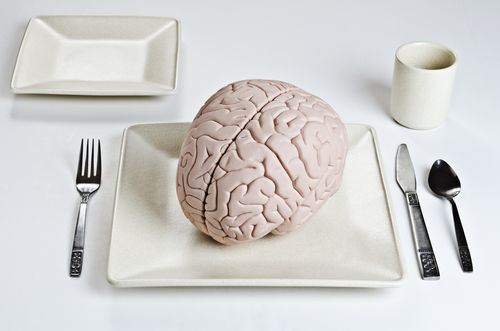How Overeating Starts: Body Fat And Unhealthy Eating Habits Of The Obese Change The Brain

Mindless eating cues are found everywhere throughout our daily lives, including the smells, sounds, and sights around us, but according to a new study, people who are obese may be more susceptible than others. Researchers at the National Institutes of Health Clinical Center scanned the brain for activity and published their surprising findings in the journal Molecular Psychiatry.
After examining the brains of 43 men and women with a variety of body fat, researchers found the obese participants had more activity in their dopamine activity, which is responsible for forming habits. They also found obese participants had less activity in the region that controls reward, which led them to believe that this may be the reason obese people tend to overeat. If the brain has been habitually trained to increase reward when a person gives in to temptation, then it’s understandable why the cheeseburger makes their mouth water more than it does a normal, healthy-sized person.
"While we cannot say whether obesity is a cause or an effect of these patterns of dopamine activity, eating based on unconscious habits rather than conscious choices could make it harder to achieve and maintain a healthy weight, especially when appetizing food cues are practically everywhere," the study’s lead author and investigator Kevin D. Hall, from the NIH’s National Institute of Diabetes and Digestive and Kidney Diseases, said in a press release. "This means that triggers such as the smell of popcorn at a movie theater or a commercial for a favorite food may have a stronger pull for an obese person — and a stronger reaction from their brain chemistry — than for a lean person exposed to the same trigger."
Everyone in the study followed the same eating, sleeping, and activity schedules, but the brain scans showed the dopamine levels were different depending on the weight of the individual. Those who were overweight were much more likely to give in to the environmental triggers and food cues surrounding them, such as certain food smells, red colors that make one hungrier, dimmer lights that encourage eating more, or even seeing other people eat.
Researchers said they needed to explore more of the relationships between the brain’s chemical secretions and the food cues that inundate our world. According to consumer behavior and nutritional science expert Brian Wansink, most of us don’t overeat because we’re hungry, but instead because of the cues from our family, friends, packages, plates, labels, lights, colors, shapes, smells, and distractions that surround us each day. Conscientiousness is the most effective weapon to make us more resistant to the cues in order to maintain a healthy lifestyle.
"These findings point to the complexity of obesity and contribute to our understanding of how people with varying amounts of body fat process information about food," Director of the National Institute of Diabetes and Digestive and Kidney Diseases Griffin P. Rodgers said in a press release. "Accounting for differences in brain activity and related behaviors has the potential to inform the design of effective weight-loss programs."
Source: Guo J, Simmons WK, Herscovitch P, Martin A, and Hall KD. Striatal dopamine D2-like receptor correlation patterns with human obesity and opportunistic eating behavior. Molecular Psychiatry. 2014.
Published by Medicaldaily.com



























